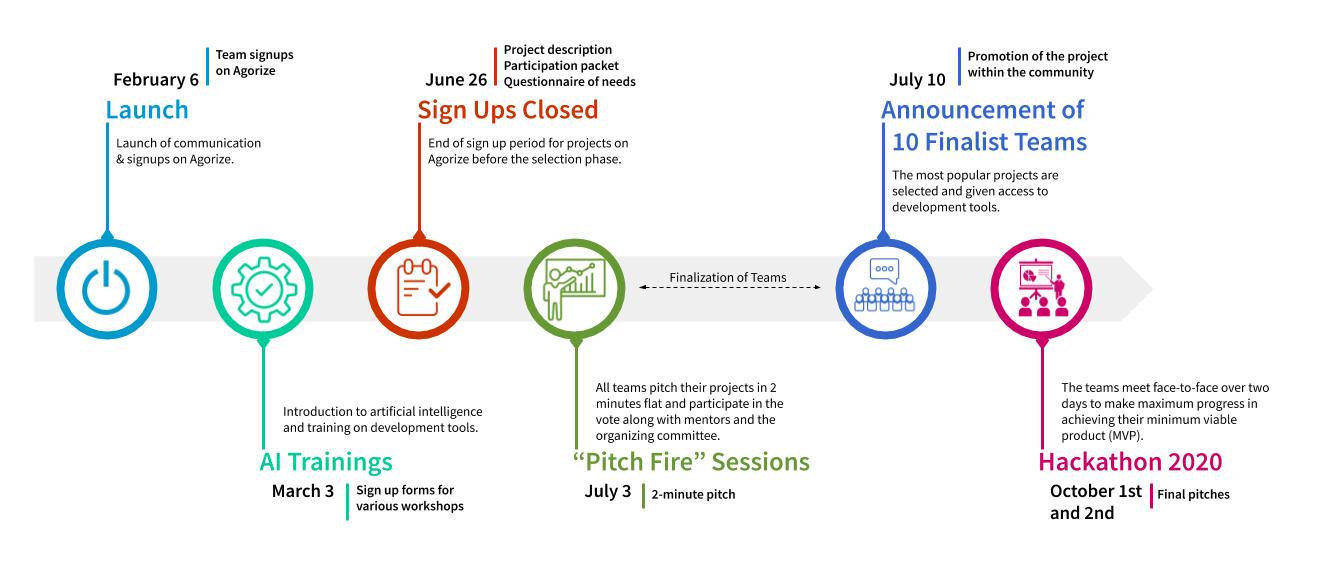A hackathon is an event where groups — usually software engineers and others involved in software development — collaborate to solve a specific problem, with the end goal of creating a working solution in a short amount of time. While they’re traditionally for software, public hackathons in the data science and machine learning space have become increasingly popular over the years. Now, we often see companies running their own internal hackathons to spur agility and innovation around data within their organization.
Bouygues Telecom, a French mobile phone, internet service provider, and IPTV company, is one such organization — the company has been running their Open Innovation hackathon for several years, each year focusing on the dissemination of new technologies and their potential applications throughout the company.

Dataiku was a partner and sponsor of the hackathon in 2020, which (prolonged and largely virtual due to the health crisis) ran from February to October and involved more than 60 people from around the company organized into 10 teams. The goal of the year’s hackathon, which was focused specifically on data science, machine learning, and AI technologies, was twofold:
- Help disseminate expertise around data and AI in the company by enabling employees to work in multidisciplinary teams.
- Start prototyping projects that weave AI into the company's business offerings and processes in an innovative way.
This blog post will delve into some of the details that made the Bouygues Telecom hackathon a success, providing insight for other organizations hoping to run their own hackathon around AI projects in 2021 and beyond.
Keys to Hackathon Success
So, what is Bouygues Telecom’s recipe for success in executing a well-organized, and ultimately fruitful, AI hackathon?
- Communication: Internally, the hackathon — and its benefits — need to be conveyed to all business lines across the organization.
- Multi-disciplinary teams: The organizers should encourage, if not require, diverse teams, which includes people from both business and technical domains.
- Support and structure: The teams should be given plenty of time to select a topic, refine the idea, prepare any necessary datasets, and (critically) train teams on tools to be used before the actual final event.
- Focus on function: In the final two-day sprint, teams had to produce a working prototype (this accounted for 50% of the team’s final score). This ensured that the projects were concrete applications of AI and that the results could be leveraged quickly.
- Executive sponsorship and visibility: Bouygues Telecom had the teams pitch their final solutions to company executives, which made up the final jury. Their comments represent 50% of the team’s final score.
In total, planning for the event lasted four to five months — with or without a global pandemic, it takes time to get buy-in from stakeholders, decide on the framework, communicate across the organization, gather participants, form teams, etc. Because the teams were focused on concrete results (projects that were built and launched within three to six months), preparation work had to include not just organization of the event itself, but readiness in terms of datasets, cloud environments, and support for tools (shout out to François Gette, who took on these tasks at Bouygues Telecom!).

Planning timeline for Bouygues Telecom's Hackathon event
Business Impact for Bouygues Telecom
In total, 10 projects were selected for the final hackathon, and they covered diverse themes including:
- The core business: Predictive maintenance of network condition and research into the root cause of incidents.
- Customers: Loyalty program personalization.
- Ecology: Management and awareness of equipment energy costs.
- New services: Recommendation engines for programs within a given customer’s TV package.
Ultimately, half of the teams chose to use Dataiku — the world’s leading data science, machine learning, and AI platform — to build their projects (and congrats to the two teams using Dataiku who finished in the top three!)
Bouygues Telecom has already seen clear benefits from the AI hackathon, the most important of which is lowering the barrier of getting started with AI. Several teams without any experienced data scientists produced working prototypes, which has given executive teams and business lines confidence that exploratory data analysis — and potentially phases of AI up to prototyping — can be successfully carried out by business units.
Similarly, by leveraging Dataiku for the hackathon, the organization became more keenly aware of the benefit technology provides and the role it plays connecting technical profiles with those from the business side to build complete solutions. Having a common ground for both resulted in support from everyone for the hackathon and the solutions developed as a result of the event.




